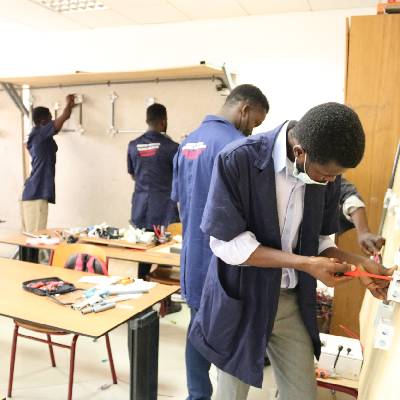
Metalcraft is a skilled trade and a craft in which the primary work performed entails the use of metals to create assemblies, individual parts as well as large scale structures.
A metal craftsman is a craftsperson or a worker skilled in metalwork.
This metal processing technology NVCET certificate aims at instilling the following skills:
- ability to communicate both orally and in writing
- ability to work in a team of other workers
- technical skills in the field of metalwork
- accuracy and precision
- creativity
Metal craftsmen can find employment opportunities in various places such as metal processing companies, steel, and metal fabrication companies, construction companies, industrial maintenance, and repair sector, sheet metal companies.
With some industry experience, metal craftsmen can also apply their skills and creativity to launch their own businesses and become self-employed while creating employment opportunities to other unemployed youth
Career prospects:
- Welder,
- Fabricators of metal and steel structures
Progression path:
- Artisan Certificate in Mechanical engineering or Welding and Fabrication
Entry Requirements
The Minimum Entry Requirements are:
- KCPE Certificate,
- Any other equivalent qualification as approved by KNEC.
The duration for the course is 4 years including compulsory industrial attachment
- Level one takes 2 years
- Level two takes 2 years
Objectives of Metal Processing Technology (NVCET)
Vocational education in carpentry and joinery is education that prepares people to work as a carpenter. Vocational education is sometimes referred to as career and technical education.
The General Education component of the curriculum aims at providing the trainee with complete secondary education in critical subjects like English Language, Economics, Physics, Chemistry, Biology, Entrepreneurial Studies and Mathematics to enhance the understanding of machines, tools and materials of their trades and their application and as a foundation for post-secondary technical education for the above-average trainee.
Hence, it is hoped that trainees who successfully complete their trade and general education may be able to compete with their secondary school counterparts for direct entry into the polytechnics or colleges of education (Technical). The Social Studies component is designed to broaden the trainee’s social skills and their understanding of the environment.
Technical and Vocational Education and Training serves multiple purposes. A key purpose is the preparation of youth for work. This takes the form of learning and developing work-related skills and mastery of underlying knowledge and scientific principles. Work is broadly defined and therefore refers to both formal employment and self-employment. To support self-employment, TVET curricula often include entrepreneurship training. Related to this is the social reproduction and transformation of occupational and vocational practices
From a development point of view, TVET facilitates economic growth by increasing the productivity of workers. The returns from increased output far exceed the costs of training, direct and indirect, leading to economic growth.
TVET like any other form of education also facilitates socio-economic development by enhancing the capacity of individuals to adopt practices that are socially worthwhile.
As a form of education similar to all others, TVET aims to develop a broad range of personal capabilities that characterize an educated person. Thus, the provision of broad-based knowledge seeks to ensure critic-creative thinking.
TVET also aims at developing capacities for effective communication and effective interpersonal relations
Related articles
-

A Guide to Civil Engineering Degree and Diploma Programs in Kenya
08-Nov-2025 -

Electrical Engineering in Kenya: A 2025 Guide for KCSE Graduates
08-Nov-2025 -

Mechanical Engineering in Kenya: A 2025 Guide for KCSE Graduates
08-Nov-2025 -

Engineering Courses in Kenya: A Guide for 2025 KCSE Graduates
08-Nov-2025 -

Education Pathways in Kenya — From Basic Education to Tertiary | College Guide
06-Nov-2025 -

The Bird and the Mirror: A Reflection on Identity, Perception, and Illusion
07-Feb-2025
Colleges offering Metal Processing Technology (NVCET)

Isiolo South

